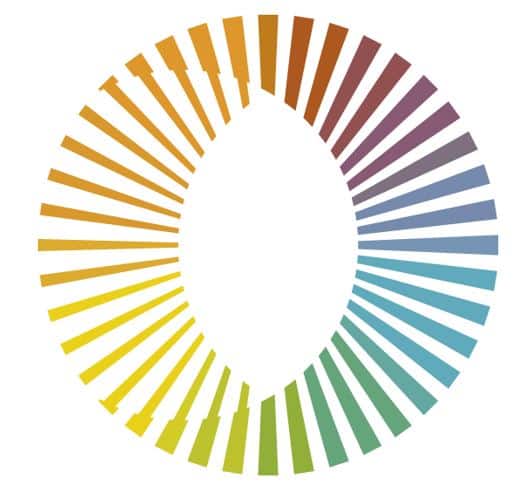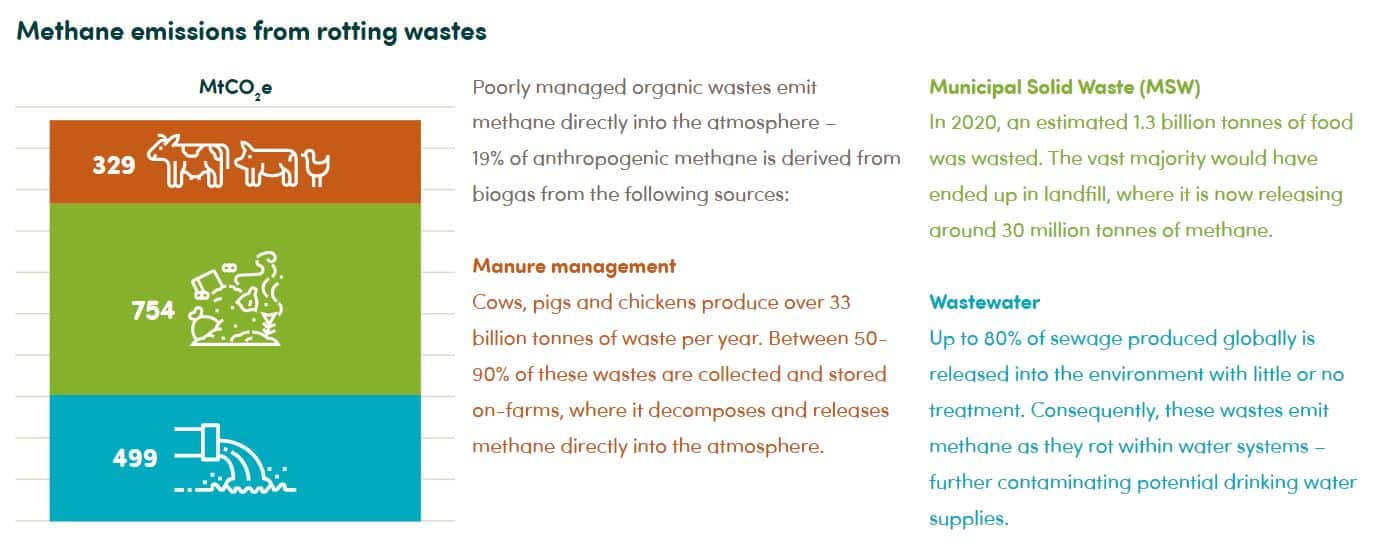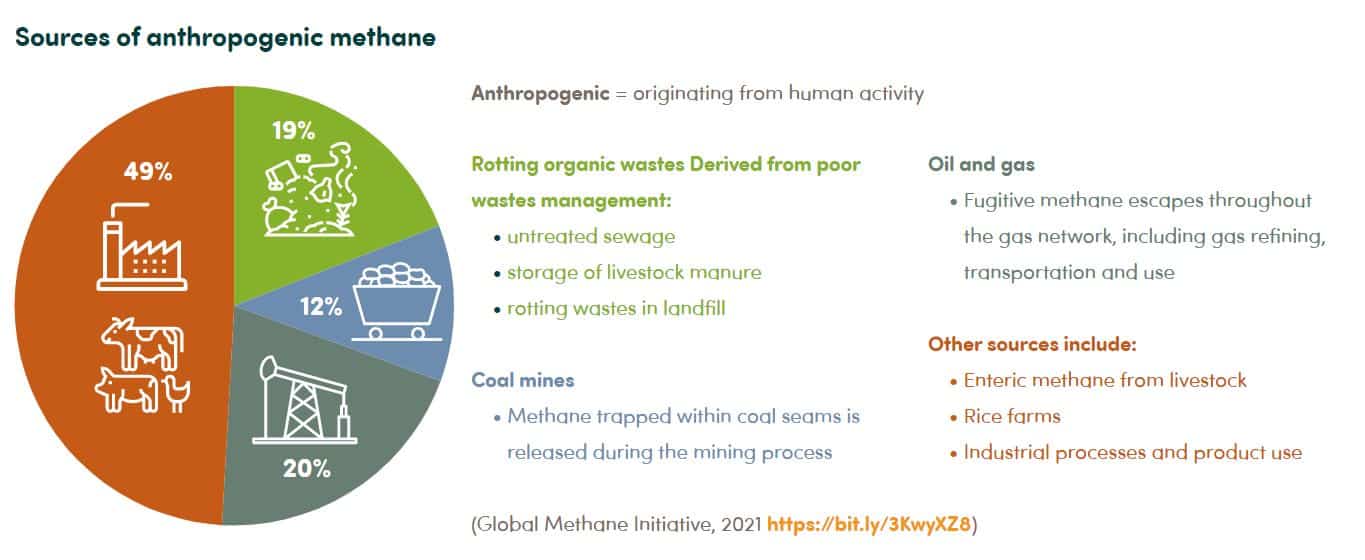
COP27 – World Biogas Association to highlight the critical role of preventing methane emissions from organic wastes in delivering the Global Methane Pledge
The global biogas trade body will host a panel discussion on how to reduce methane emissions from organic wastes in partnership with the Global Alliance for Incinerator Alternatives (GAIA).
- The session will take place in the Blue Zone on 17th November (16.45-18.15 local time)
- Reducing methane emissions is recognised as the most effective way to achieve Paris Agreement targets
- Humans generate over 105bn tonnes of organic wastes every year, all of which release methane as they decompose
- Collecting these organic wastes and recycling them into biogas, biomethane, bioCO2, biofertilisers and other valuable bioproducts, would contribute 50% of the Global Methane Pledge target.
- In the build-up to COP27, WBA will be hosting a free webinar this Thursday, 3rd November, to launch its “Delivering the Global Methane Pledge” policy briefing
A year from the launch of the Global Methane Pledge (GMP) at the Conference of Parties 26 (COP26) in Glasgow, UK, the World Biogas Association (WBA) has joined forces with the Global Alliance for Incinerator Alternatives (GAIA) to host a panel discussion focussing on how to reduce methane emissions – the greenhouse gas 86 times as potent as CO2 when released into the atmosphere – from organic wastes.
The international community has recognised that “rapidly reducing methane emissions from energy, agriculture and waste is regarded as the single most effective strategy to keep the goal of limiting warming to 1.5˚C.” The Global Methane Pledge, signed by over 100 countries at COP26 in 2021 as part of their efforts to meet this target, commits them to reducing global methane emissions by at least 30% of 2020 levels by 2030. To achieve the GMP aim, whilst building climate resilience and flourishing local economies, they need to put in place affordable and effective strategies – fast.
“Organic wastes are the third largest source of methane emissions, with untreated food waste, livestock manure and slurries, and sewage all emitting potent methane emissions (see Fig 1),” explains WBA’s Chief Executive Charlotte Morton.
“Collecting these wastes separately and recycling them into a range of valuable bioproducts, including biogas, biomethane and biofertilisers, through anaerobic digestion (AD) could rapidly deliver 50% of the Global Methane Pledge, and enough green gas to replace a third of today’s fossil natural gas consumption.
“AD is a mature technology that can be deployed within a few years,” she continues. “It takes two years to build a plant if the right regulatory framework is in place. What is urgently needed now is for countries to put in place that regulatory framework, including the organic waste collection infrastructure necessary to ensure these wastes go to AD for treatment.”
Fig 1 – methane emissions by sources of organic wastes

The WBA/GAIA panel discussion will gather speakers from government, advocacy and climate finance and review the solutions available and the regional contexts to consider in reducing methane emissions in the waste sector. Panellists will include representatives from the Global Methane Hub, Accra City Government (Ghana), Pesticide Action Network, Instituto Pólis (Brazil), Minneapolis Environmental Justice Table (USA) alongside speakers from WBA and GAIA.
Ahead of the event, WBA will launch its pamphlet “Delivering the Global Methane Pledge” at a free webinar on 3rd November, featuring speakers from the Global Methane Initiative, the C40 Cities Network and ABiogás. You can register HERE.
WBA will also exhibit alongside the Centre for Clean Air Policy (CCAP) in the COP27 Blue Zone from the 14th to 17th November – Stand 23 under the theme Agriculture, Food and Land.
– ENDS –
For further information, contact:
Jocelyne Bia, Senior Communications Consultant
e: jbia@worldbiogasassociation.org ; tel: +44 (0)20 3716 0592
Notes to Editors:
- Launched at COP22 in Marrakesh in 2016, the World Biogas Association is the global trade association for the biogas, landfill gas and anaerobic digestion (AD) sectors, and is dedicated to facilitating the recycling of all organic wastes and residues through biogas globally. It believes that the global adoption of biogas technologies is a multi-faceted opportunity to produce clean, renewable energy, bioCO2 and natural fertilisers while resolving global issues related to development, public health, and economic growth. www.worldbiogasassociation.org
- The Global Alliance for Incinerator Alternatives (GAIA) is a network built on the deeply rooted community knowledge of its members and the local expertise of its regional communities, exchanging the cross-border knowledge and tools needed to create a truly global movement that puts an end to waste pollution. GAIA’s mission is to catalyze a global shift towards environmental justice by strengthening grassroots social movements that advance solutions to waste and pollution. They envision a just, zero waste world built on respect for ecological limits and community rights, where people are free from the burden of toxic pollution, and resources are sustainably conserved, not burned, or dumped. www.no-burn.org/about/
- Rotting wastes represent 19% of the anthropogenic source of methane emissions, behind livestock, rice farms and industrial processes (49%) and the oil and gas sector (20%)
 The Global Methane Pledge seeks to reduce anthropogenic emissions by 30% from 2020 levels by 2030 – at full potential, anaerobic digestion (AD) can avoid 1,152MtCO2 of methane emissions by – this represents ~50% of the GMP target.
The Global Methane Pledge seeks to reduce anthropogenic emissions by 30% from 2020 levels by 2030 – at full potential, anaerobic digestion (AD) can avoid 1,152MtCO2 of methane emissions by – this represents ~50% of the GMP target.- Recycling all organic wastes through AD would generate enough biomethane to replace one third of global fossil natural gas consumption.
- Full deployment of the AD and biogas industry would create between 11-15 million jobs worldwide

